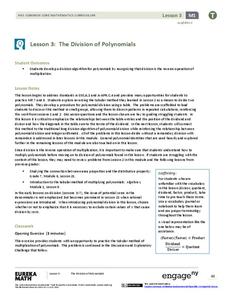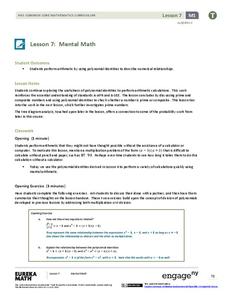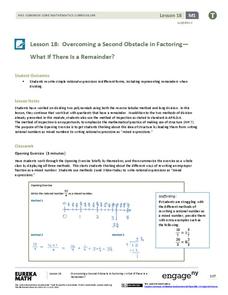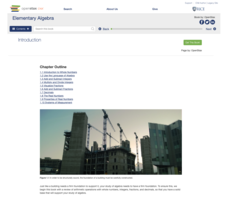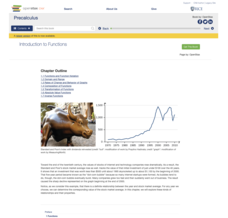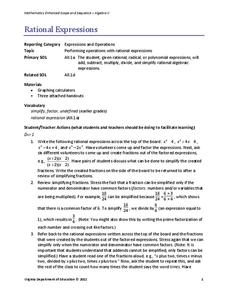EngageNY
The Division of Polynomials
Build a true understanding of division of polynomials. Learners use their knowledge of multiplying polynomials to create an algorithm to divide polynomials. The area model of multiplication becomes the reverse tabular method of division.
West Contra Costa Unified School District
Polynomial Division
How do you apply the traditional division algorithm to polynomials? Here is an Algebra II lesson that extends the use of the division algorithm to polynomials. After establishing the concept of long division, synthetic division and the...
EngageNY
Mental Math
Faster than a speedy calculator! Show your classes how to use polynomial identities to multiply numbers quickly using mental math.
Virginia Department of Education
Multiplying Polynomials Using Algebra Tiles
Tiles are not just for algebra—see how they can help with multiplication too. Young mathematicians learn to use algebra tiles to model the multiplication of polynomials. A follow-up worksheet provides practice with the skill.
CK-12 Foundation
Multiplying Polynomials
Help your class find patterns in polynomial multiplication. Pupils multiply a trinomial by a binomial using a graphic organizer. They respond to questions about patterns observed in polynomial multiplication before a discussion question...
Virginia Department of Education
Adding and Subtracting Polynomials Using Algebra Tiles
Scholars learn how using algebra tiles to add and subtract polynomials can model how to combine polynomials. They use their newfound knowledge to complete a worksheet of problems.
EngageNY
Overcoming a Second Obstacle in Factoring—What If There Is a Remainder?
Looking for an alternative approach to long division? Show your classes how to use factoring in place of long division. Increase their fluency with factoring at the same time!
Mathematics Assessment Project
Arithmetic with Polynomials and Rational Expressions
It all starts with arithmetic. An educational resource provides four items to use in summative assessments. The items reflect the basic skill level required by the standards in the domain and are designed to have...
EngageNY
The Multiplication of Polynomials
If you can multiply multi-digit integers, you can multiply polynomials. Learners use an area model to compare multiplying numbers to multiplying polynomials. They progress to using the distributive property.
EngageNY
Mid-Module Assessment Task - Algebra 2 (Module 1)
Challenge classes to think deeply and apply their understanding of polynomials. The assessment prompts learners to use polynomial functions to model different situations and use them to make predictions and conclusions.
Rice University
Elementary Algebra
Find all the Algebra 1 content in one location. A helpful eBook contains the content typically found in an Algebra 1 course. Concepts range from solving and graphing linear equations to solving and graphing quadratic equations....
EngageNY
Polynomial, Rational, and Radical Relationships
This assessment pair goes way beyond simple graphing, factoring and solving polynomial equations, really forcing learners to investigate the math ideas behind the calculations. Short and to-the-point questions build on one another,...
EngageNY
The Remainder Theorem
Time to put it all together! Building on the concepts learned in the previous lessons in this series, learners apply the Remainder Theorem to finding zeros of a polynomial function. They graph from a function and write a function from...
Rice University
Precalculus
Take a step beyond Algebra 2. Learners use the eBook to learn concepts from the typical Precalculus course. Content starts off with a short review of functions in general and moves on to the basic functions, finishing up with more...
Virginia Department of Education
Rational Expressions
Demonstrate the progression of operations with rational expressions through a multi-day lesson, equipped with worksheets for each day. High schoolers develop the concepts needed to perform operations with rational expressions....
EngageNY
Equivalent Rational Expressions
Rational expressions are just fancy fractions! Pupils apply fractions concepts to rational expressions. They find equivalent expressions by simplifying rational expressions using factoring. They include limits to the domain of the...
EngageNY
Complex Numbers and Transformations
Your learners combine their knowledge of real and imaginary numbers and matrices in an activity containing thirty lessons, two assessments (mid-module and end module), and their corresponding rubrics. Centered on complex numbers and...
